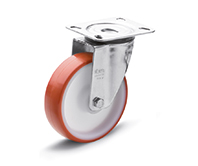Cast iron wheels are a critical component in various industrial and material handling applications due to their robust strength, high load-bearing capacity, and durability. However, like all equipment, they require regular maintenance to ensure they continue to perform efficiently and have a long lifespan. Proper care not only enhances the functionality of cast iron wheels but also contributes to the overall safety and efficiency of material handling systems.
In this blog, we will explore practical tips on maintaining cast iron wheels to extend their life and ensure they function optimally. We will also highlight insights from Castor Wheel Manufacturers and Exporters in India who provide high-quality cast iron wheels designed for durability and performance.
—
- Regular Inspections
Routine inspections are crucial for identifying potential issues before they escalate into serious problems. Regularly check your cast iron wheels for:
– Cracks and Chips: Inspect the surface of the wheels for any visible cracks or chips. These can be caused by impacts or overloading and may lead to more significant damage if not addressed.
– Rust and Corrosion: Although cast iron is relatively resistant to rust, prolonged exposure to moisture can lead to corrosion. Look for signs of rust and address them promptly.
– Wear and Tear: Assess the tread and overall condition of the wheels. Worn-out treads can affect the wheel’s efficiency and safety.
By identifying and addressing these issues early, you can prevent costly repairs and ensure that your wheels continue to perform effectively.
—
- Cleaning Practices
Keeping cast iron wheels clean is essential to maintaining their functionality and appearance. Dirt, debris, and grime can accumulate on the wheels, leading to increased friction and reduced performance. Follow these cleaning practices:
– Regular Cleaning: Use a soft brush or cloth to remove loose dirt and debris from the wheels. For more stubborn grime, a mild detergent solution can be applied. Avoid using abrasive materials that might scratch the surface.
– Drying: After cleaning, thoroughly dry the wheels to prevent moisture buildup, which can cause rust and corrosion.
Regular cleaning helps maintain the wheels’ smooth operation and extends their lifespan.
—
- Lubrication
Proper lubrication is crucial for reducing friction between the cast iron wheels and their axles or bearings. Lubrication prevents excessive wear and ensures smooth movement. Here’s how to do it:
– Choose the Right Lubricant: Use lubricants that are suitable for industrial applications. These should be able to withstand high pressures and temperatures.
– Apply Regularly: Follow the manufacturer’s recommendations for lubrication intervals. Over-lubrication or under-lubrication can both lead to issues, so ensure you apply the right amount.
Effective lubrication minimizes friction and helps the wheels operate smoothly, reducing wear on both the wheels and the equipment.
—
- Proper Storage
Proper storage of cast iron wheels when they are not in use is crucial to prevent damage. Follow these storage tips:
– Keep Dry: Store the wheels in a dry environment to prevent rust and corrosion. Moisture can cause the cast iron to deteriorate over time.
– Avoid Chemical Exposure: Ensure that the wheels are stored away from chemicals or substances that could potentially damage them.
By storing cast iron wheels correctly, you can avoid unnecessary wear and extend their service life.
—
- Alignment and Balancing
Proper alignment and balancing of cast iron wheels are essential for optimal performance and longevity:
– Check Alignment: Ensure that the wheels are properly aligned with the equipment. Misalignment can cause uneven wear and reduced efficiency.
– Balance Loads: Make sure the load is evenly distributed. Uneven loads can put extra stress on one side of the wheel, leading to premature wear.
Regular checks and adjustments help maintain even wear and prevent potential issues with equipment performance.
—
- Addressing Wear and Tear
Despite best efforts, cast iron wheels will eventually show signs of wear and tear. It’s important to address these issues promptly:
– Replace Worn Components: If you notice significant wear on the wheels or their components, such as bearings or axles, replace them as needed.
– Monitor Performance: Pay attention to changes in the wheel’s performance. If the wheels are not functioning as smoothly as they should, it may be time for maintenance or replacement.
Timely replacement of worn components prevents further damage and maintains the efficiency of your material handling systems.
—
- Choosing Quality Wheels
Selecting high-quality cast iron wheels from reputable manufacturers can significantly impact their longevity and performance. Castor Wheel Manufacturers and Exporters in India are known for producing durable and reliable cast iron wheels designed to withstand tough industrial conditions. Consider these factors when choosing wheels:
– Material Quality: Opt for wheels made from high-grade cast iron that offers superior strength and durability.
– Manufacturer Reputation: Choose wheels from well-known manufacturers with a reputation for quality and reliability.
– Customization Options: Many Indian manufacturers offer customization to meet specific needs, ensuring that the wheels are suitable for your particular application.
High-quality wheels are less likely to experience premature failure and require less maintenance over time.
—
- Adhering to Manufacturer Guidelines
Following the manufacturer’s guidelines for installation, operation, and maintenance is crucial. Manufacturers provide specific recommendations based on the design and intended use of the wheels. Adhering to these guidelines ensures optimal performance and extends the life of the wheels.
—
Conclusion
Maintaining cast iron wheels properly is essential for ensuring their longevity and efficient performance in material handling applications. Regular inspections, cleaning, lubrication, and proper storage are key practices that help extend the life of these robust components. Additionally, choosing high-quality wheels from Castor Wheel Manufacturers and Exporters in India ensures you start with a durable product that requires less maintenance.
By following these maintenance tips and investing in quality cast iron wheels, you can enhance the efficiency of your material handling systems, reduce downtime, and save on long-term costs.
